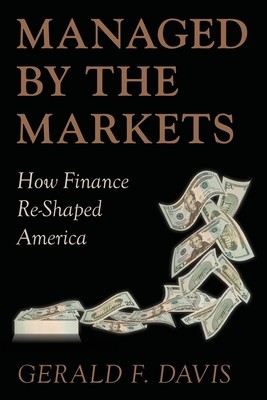
- We will send in 10–14 business days.
- Author: Gerald F Davis
- Publisher: Oxford University Press, USA
- ISBN-10: 0199691924
- ISBN-13: 9780199691920
- Format: 15.2 x 23.1 x 2 cm, minkšti viršeliai
- Language: English
- SAVE -10% with code: EXTRA
Reviews
Description
In recent years, we've been rocked by a series of economic jolts, and all of them seemed to revolve around finance. And the most recent, the American mortgage meltdown, has sent shock waves around the world. Managed by the Markets, which won the 2010 George R. Terry Book Award, offers an illuminating account of how finance has replaced manufacturing at the center of the American economy over the past three decades, explaining how the new finance-centered system works, how we got here, and what challenges lay ahead.
Since the early 1980s, Gerald F. Davis shows, finance and financial considerations have increasingly taken center stage, dramatically reshaping American society. Corporations now have an overriding focus on creating shareholder value, while their personnel practices no longer provide secure employment, economic mobility, health insurance, or retirement benefits. Instead, employees must become shareholding free-agents, left to their own fate. Banking has shifted from the traditional role of taking in deposits and making loans to the widespread use of "securitization," turning loans (such as mortgages or corporate debt) into bonds owned by institutional investors. The financial services industry is both more concentrated among large banks and mutual funds, yet more spread out among under-regulated specialists such as mortgage finance companies and hedge funds. And states increasingly act as "vendors" in a global marketplace of law, emulating firms such as Nike, hiring contractors to domuch of the work of government. As a result, individuals and households find their welfare tied to the stock market and the mortgage market as never before. And the turbulence of recent years starkly underscores the dangers of depending too much on financial markets. Written in the spirit of C. Wright Mills' penetrating The Power Elite and White Collar, this brilliant study provides an invaluable map of the finance-driven American society.
EXTRA 10 % discount with code: EXTRA
The promotion ends in 22d.17:16:28
The discount code is valid when purchasing from 10 €. Discounts do not stack.
- Author: Gerald F Davis
- Publisher: Oxford University Press, USA
- ISBN-10: 0199691924
- ISBN-13: 9780199691920
- Format: 15.2 x 23.1 x 2 cm, minkšti viršeliai
- Language: English English
In recent years, we've been rocked by a series of economic jolts, and all of them seemed to revolve around finance. And the most recent, the American mortgage meltdown, has sent shock waves around the world. Managed by the Markets, which won the 2010 George R. Terry Book Award, offers an illuminating account of how finance has replaced manufacturing at the center of the American economy over the past three decades, explaining how the new finance-centered system works, how we got here, and what challenges lay ahead.
Since the early 1980s, Gerald F. Davis shows, finance and financial considerations have increasingly taken center stage, dramatically reshaping American society. Corporations now have an overriding focus on creating shareholder value, while their personnel practices no longer provide secure employment, economic mobility, health insurance, or retirement benefits. Instead, employees must become shareholding free-agents, left to their own fate. Banking has shifted from the traditional role of taking in deposits and making loans to the widespread use of "securitization," turning loans (such as mortgages or corporate debt) into bonds owned by institutional investors. The financial services industry is both more concentrated among large banks and mutual funds, yet more spread out among under-regulated specialists such as mortgage finance companies and hedge funds. And states increasingly act as "vendors" in a global marketplace of law, emulating firms such as Nike, hiring contractors to domuch of the work of government. As a result, individuals and households find their welfare tied to the stock market and the mortgage market as never before. And the turbulence of recent years starkly underscores the dangers of depending too much on financial markets. Written in the spirit of C. Wright Mills' penetrating The Power Elite and White Collar, this brilliant study provides an invaluable map of the finance-driven American society.


Reviews